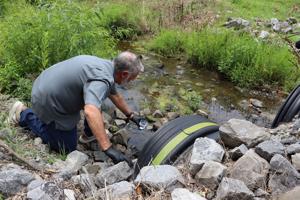Science
Calls for Global Ban on PFAS Intensify Amid Rising Health Risks

Concerns over per- and polyfluoroalkyl substances, commonly known as PFAS or “forever chemicals,” are escalating, prompting calls for a comprehensive global ban. These chemicals, which number over 10,000, are prevalent in numerous consumer products, including nonstick cookware, waterproof clothing, and fire-fighting foam. Their persistence in the environment and human body poses significant health risks, including links to cancer and fertility complications.
Recent findings highlight the widespread contamination of PFAS in various ecosystems. In the Netherlands, for instance, the National Institute for Public Health and the Environment has warned residents against consuming eggs from backyard chickens due to elevated PFAS levels. This contamination may stem from earthworms that have ingested PFAS, which hens subsequently consume.
Widespread Contamination and Health Concerns
Environmental groups, including Wildlife and Countryside Link and the Rivers Trust, have reported alarming levels of PFAS in England’s waterways, with nearly all rivers, lakes, and ponds exceeding proposed safety limits. A separate investigation, the Forever Pollution Project, identified 23,000 contaminated sites across Europe. France has taken action by banning tap water in 16 communes due to PFAS contamination.
The health implications are dire. PFAS exposure has been linked to various health issues, such as increased cancer risk, fertility problems, and weakened immune systems. Internal documents from major manufacturers like 3M Co. and DuPont de Nemours Inc. reveal that these companies were aware of the toxins’ accumulation in humans for decades without disclosing the information to the public. While 3M has committed to phasing out PFAS by the end of 2025, the company still asserts that its PFAS products are safe for regular use.
The financial repercussions of PFAS pollution are staggering. The global PFAS market is valued at over $28 billion, but the cost of cleaning up related pollution in the UK and Europe could reach €100 billion (approximately $116 billion) annually if no action is taken. Additionally, healthcare costs related to PFAS exposure are estimated at €52 billion each year, according to the Nordic Council of Ministers.
Regulatory Landscape and Future Actions
Some consumer brands, such as Patagonia Inc. and McDonald’s Corp., have pledged to eliminate PFAS from their products. However, comprehensive regulation remains inconsistent. Denmark has announced it will ban the import and sale of PFAS-treated clothing and waterproofing agents starting in July 2026, while France has put restrictions on several consumer products, including textiles and cosmetics. Cookware, however, was exempted from these bans due to lobbying efforts from major manufacturers.
In 2023, five European Union member states—Germany, the Netherlands, Sweden, Denmark, and Norway—proposed a significant ban on PFAS, which is currently under review by the European Chemicals Agency. This proposed ban would regulate all identified PFAS as a group rather than individually, an approach that could expedite the regulatory process, which would otherwise take over 40,000 years if each chemical were evaluated separately.
While the EU’s initiative represents a potential turning point, the timeline for implementation is still uncertain, with new regulations not expected to take effect until at least 2028. Meanwhile, the UK government has faced criticism for its lack of urgency and comprehensive approach to PFAS regulation. In the United States, the previous administration reduced funding for PFAS research, and the Environmental Protection Agency has indicated plans to rescind drinking water limits for certain PFAS.
The urgency to act against PFAS is clear. Even if a ban were enacted today, existing contamination in human bodies and the environment would remain. Yet, history shows that restrictions can lead to positive outcomes, as seen with the decline in blood concentrations of banned PFAS chemicals like PFOS and PFOA in Denmark.
It is time to prioritize a universal ban on PFAS to mitigate the ongoing health and environmental crisis. As the consequences of inaction grow more severe, the need for decisive action has never been more critical.
-

 Lifestyle5 months ago
Lifestyle5 months agoLibraries Challenge Rising E-Book Costs Amid Growing Demand
-

 Sports5 months ago
Sports5 months agoTyreek Hill Responds to Tua Tagovailoa’s Comments on Team Dynamics
-

 Sports5 months ago
Sports5 months agoLiverpool Secures Agreement to Sign Young Striker Will Wright
-

 Lifestyle5 months ago
Lifestyle5 months agoSave Your Split Tomatoes: Expert Tips for Gardeners
-

 Lifestyle5 months ago
Lifestyle5 months agoPrincess Beatrice’s Daughter Athena Joins Siblings at London Parade
-

 Science4 months ago
Science4 months agoSan Francisco Hosts Unique Contest to Identify “Performative Males”
-

 World5 months ago
World5 months agoWinter Storms Lash New South Wales with Snow, Flood Risks
-

 Science5 months ago
Science5 months agoTrump Administration Moves to Repeal Key Climate Regulation
-

 Business5 months ago
Business5 months agoSoFi Technologies Shares Slip 2% Following Insider Stock Sale
-

 Science5 months ago
Science5 months agoNew Tool Reveals Link Between Horse Coat Condition and Parasites
-

 Sports5 months ago
Sports5 months agoElon Musk Sculpture Travels From Utah to Yosemite National Park
-

 Science5 months ago
Science5 months agoNew Study Confirms Humans Transported Stonehenge Bluestones









